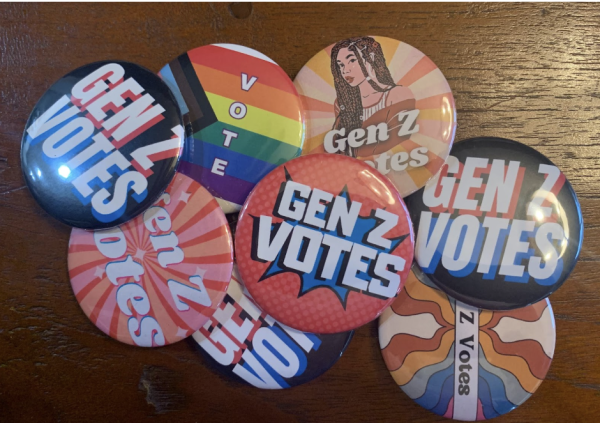The Metaverse: The Future or a Doomed Failure?
Facebook CEO Mark Zuckerberg announces the company will change its name to Meta during a statement on October 28th, 2021.
September 25, 2022
Over 15 years ago, Steve Jobs unveiled the iPhone, an invention that fundamentally changed the structure of the modern world. Today, people like Mark Zuckerberg seek a more profound impact with the Metaverse. But Zuckerberg’s Meta already faces major obstacles.
The idea of the Metaverse was first introduced in Neal Stephenson´s 1992 science fiction novel “Snow Crash.” In it, the protagonist travels between dystopian Los Angeles and a dystopian virtual world called the Metaverse. Zuckerberg commodified the idea of the Metaverse in October 2021 with his company, Meta. Since then, the Metaverse has been a prize in the minds of corporate executives everywhere from Microsoft to Disney.
Various groups and businesses have attempted to cash in on the Metaverse, seeing it as a tool for developing already existing industries. Everything from education and healthcare to retail and travel is now in some way trying to be part of the Metaverse. Virtual reality is regarded as an effective way for many industries to grow. The Metaverse is also advertised as a social hub for making friends and even dating. But is this what people outside of boardrooms actually want, or is this just another corporate overreach?
For starters, the people putting their time and money into creating the Metaverse don’t exactly have the best track record when it comes to transparency. Facebook/Meta, for example, is notorious for mishandling users’ private information. In October 2018, Facebook was issued a $643,000 fine for the Cambridge-Analytica scandal, which involved the unauthorized collection of personal data from up to 87 million users. That’s just the tip of the iceberg: Facebook was accused of inciting violence in Myanmar by allowing hate speech against the Rohingyas on their platform. As a result, Zuckerberg and his company have become associated with misinformation and threats to democracy. Even the public reception to the Metaverse as it relates to gaming has been far from positive. The demo for Horizon Worlds, a VR social game created by Meta, was panned by onlookers for its terrible graphical quality, becoming an embarrassment for Meta.
The target audience for the Metaverse is Gen Z and Millennials. State High experts in media/engineering technology and business ethics have similar definitions of the Metaverse even as they raise different concerns.
Technology Education Teacher Christopher Avvampato emphasizes the difference between virtual reality and the Metaverse, which he defines “as a digital environment, which was created to escape the real world.”
On the potential for State High to enter the Metaverse, he states: “I don’t think the class on the Metaverse specifically is such a great idea due to the lack of accountability that would expose students to potential dangers like harassment or a lack of moderation in that space. But I do believe VR and virtual reality can be used in an educational environment. The key thing here is the separation of the Metaverse and Virtual Reality.”
As new technologies come into the world, Avvampato reminds us that no technology is “harmless,” so students and teachers have to think through their impact.
“It’s kind of funny, even though I’m a tech ed teacher and engineering teacher, I realize that everything has a positive and negative result. You just have to kind of look at that unbiased and then determine, all right, well, are the positives worth the negatives?”
Fellow State High teacher Jeffrey Kissell, who covers business ethics in his Business Law class, also raised concerns regarding accountability and the potential to privilege the digital over the physical world.
“I think it’s tricky because any time you have a place where you can go anonymous, that’s tricky with ethics because you technically cannot be held accountable for your actions. Remember in law we study media bias, and the falsehoods that media is portraying or implementing or advertising. So it’s very difficult to think about ethics and the Metaverse because it’s such a way out there concept, isn’t it?” Kissell suggested.
According to Kissell, a combination of the digital world and physical world defines the Metaverse. He advises continuing to choose the physical world even as technology progresses.
“It’s very difficult to stop technological progress. However, it’s very important for a person to keep things that are important to them in perspective. And that’s thing, those things could be face to face interactions, walks in woods, hiking, going to sporting events, going to concerts, etc.”
Elijah Adu, a senior at State High, brings a unique perspective to the Metaverse as a former research associate at the NASA tREXs project, current Vice President of the State High Technology Student Association (TSA), and PA Sergeant of Arms for the TSA.
Since the Metaverse is largely a Meta-created project, Adu argues that the Metaverse is now defined as a product of Meta.
“How would I define the Metaverse? If I’m being completely honest, I think the Metaverse, as defined right now, is the property of Meta as a company. I think that they’ve coined this term essentially, or if not necessarily coined the term they’ve co-opted it so that it means exclusively their product, their platform. I think the idea of, you know, a virtual second world has been around far before the existence of a Metaverse like with companies.”
In addition to concerns about a commodified Metaverse, VR also has practical limits that Adu describes as a “chicken and egg situation” between developers and users.
“People aren’t developing for, they aren’t innovating for, they aren’t creating for VR platforms because other people aren’t using it,” Adu explained.
“I would say the technology isn’t where it needs to be, especially in terms of accessibility. Now, obviously accessibility has gotten a lot better with the introduction of cheaper VR headsets and the kind of more streamlined and computer-aided design for like 3d models and applications, which is kind of inherent to any VR space. But overall I think the technology isn’t where it needs to be in order to attract the kind of consumer that would then be able to start like a chain reaction of more and more people using it” said Adu, expanding on his stance.
Adu also criticizes the corporate nature of the project, claiming that monetization makes the idea of the Metaverse fundamentally less appealing.
“I think that when you’re looking to build a platform, attempting to go about it through a corporate, purely capitalist, framework is almost doomed to fail. If you look at previous, mass platform adoptions, they almost always come on the back of something that was kind of publicly funded government supported. If you look at like the internet specifically, you saw that a lot of that research was done, through both CERN and DARPA, both government agencies just here and in Europe.”
Based on the expertise of State High, there’s little to be excited about the Metaverse. The anonymous nature paves the way for a lack of accountability on the part of its users, and Meta’s already questionable actions in the past paint an unappealing picture of their goals for the project. Meta, above all else, views the Metaverse as a way to make more money, and not as a way to benefit the public. The stock market agrees;The future of the Metaverse is already very bleak.













Amy Jackson • Sep 29, 2022 at 6:43 AM
Metaverse is the future. it will slowly evolve. We should give time to the companies and developers who are working on it. at first there might be security issues but i am sure companies will come up with right solutions to protect the security of users. https://reliablegroup.com/